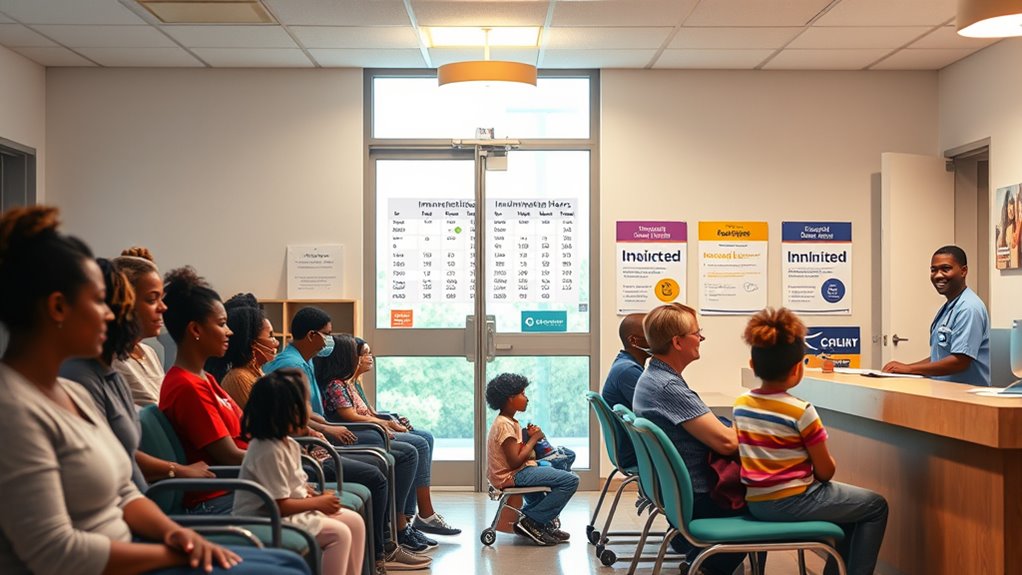Most immunization clinics operate Monday through Friday, typically from 8 a.m. to 3 or 4:30 p.m., but hours can vary and may include lunch breaks. Some clinics might close early or unexpectedly if capacity is reached, and they often close on holidays like Martin Luther King Day or Labor Day. To guarantee you don’t miss your shot, check specific hours beforehand. Continue exploring to find tips on scheduling, documentation, and making the most of your visit.
Key Takeaways
- Most clinics operate Monday to Friday from 8 a.m. to 3 or 4:30 p.m., so plan accordingly.
- Check local clinic hours and holiday schedules in advance to avoid missing vaccination opportunities.
- Appointments are recommended; walk-in options may be available but verify policies beforehand.
- Clinics often close early without notice if capacity is reached; arrive early to ensure service.
- Bring vaccination records and necessary documentation, including insurance or eligibility proof, for a smooth visit.

Are you wondering when you can get vaccinated at your local immunization clinic? Knowing the operating hours is essential to guarantee you don’t miss your chance, especially during busy seasons like back-to-school or flu outbreaks. Most clinics operate Monday through Friday, typically from 8 a.m. to around 3 or 4:30 p.m., providing weekday access that fits into your work or school schedule. Keep in mind, many clinics close for a lunch break, often between noon and 1 p.m., so plan accordingly to avoid missing out. Some clinics may close early without notice if they reach capacity or face operational limits, so it’s a good idea to confirm hours beforehand. Also, be aware that holiday closures happen at certain clinics, including days like Martin Luther King Day, Independence Day, or Labor Day, which could affect your vaccination plans if you’re trying to get vaccinated around those dates.
Most clinics operate weekdays from 8 a.m. to 3 or 4:30 p.m., with lunch breaks and holiday closures to consider.
When planning your visit, remember that most clinics operate by appointment, though walk-in options may be available at some locations. It’s highly recommended to schedule your appointment in advance through phone or online registration, especially for vaccines that require specific timing or doses. Clinics often encourage, but don’t require, registering ahead of time for walk-in visits, so check your local clinic’s policies to save time. If you’re bringing minors, be prepared to have a guardian or adult present during vaccination, and bring the necessary documentation like proof of insurance or eligibility for low-cost programs. Vaccination records might also be reviewed to guarantee you’re up to date with recommended schedules.
Vaccine storage is a crucial aspect of proper immunization, and staff training plays an essential role in maintaining this. Well-trained staff know how to handle vaccines correctly, ensuring they are stored at the right temperatures and safely administered. This expertise helps prevent vaccine wastage and guarantees that you receive effective protection. During peak seasons and outbreaks, clinics may extend hours or increase services, including offering newer vaccines such as the 2024–2025 COVID-19 shots. They also adapt schedules to public health advisories and vaccine supply, so staying informed about seasonal updates can help you plan your visit better. Additionally, understanding vaccine storage protocols can improve trust in the immunization process and ensure safety for all patients.
Clinics in public health departments or health hubs often provide a variety of vaccines, including routine childhood doses, adult vaccines, and travel immunizations. Costs vary depending on your insurance status or program eligibility, with Medicaid widely accepted at many public clinics. Expect administration fees ranging from around $13.75 to $22 per dose, with some clinics adding administrative charges. To avoid surprises, verify what costs apply before your appointment. Transportation assistance may also be available at certain locations, making it easier for you to access vaccines without hassle. Vaccines are generally available year-round, ensuring you can get protected regardless of the season. By understanding these hours and policies, you can guarantee you don’t miss your shot and stay protected all year round.
Frequently Asked Questions
Are Walk-Ins Accepted During Immunization Clinic Hours?
Yes, walk-ins are generally accepted during immunization clinic hours, but it’s best to verify your clinic location’s policies first. You might need to provide your vaccination records, especially if you’re getting a specific shot or follow-up. While many clinics handle walk-ins, registering online can save you time and ensure your spot. Always confirm capacity and hours beforehand to avoid missing out on your chance to get vaccinated.
Do Clinic Hours Vary for Different Age Groups?
Think of the clinic hours like a community theater: everyone’s invited during the same showtime, regardless of age. The schedule stays consistent, offering you access to vaccines without age-specific hours. While age-specific vaccines and scheduling flexibility matter for your shot plan, they don’t change when you can come in. You can confidently visit during open hours, knowing the clinic’s doors are always open to all, no matter your age.
Is There a Waitlist for Full Clinics?
You might wonder if there’s a waitlist for full clinics. Vaccine availability and clinic capacity influence this. Not all clinics offer waitlists, and practices vary by location and vaccine type. During high demand, some clinics implement waitlists managed digitally or manually. Check directly with your local health department or clinic, as policies differ. If capacity is maxed out, a waitlist could help you secure a future appointment when spots open up.
Are Appointments Necessary or Just Walk-In?
Think of the vaccine schedule as your roadmap—appointments are the GPS guiding you smoothly to your destination. You don’t always need to schedule, but making an appointment helps guarantee your immunization records are up-to-date, vaccines are available, and wait times are shorter. Walk-ins are possible, but they can be unpredictable, causing longer waits. For a quicker, more reliable experience, scheduling an appointment is highly recommended.
What Should I Bring to My Immunization Appointment?
For your immunization appointment, make certain to bring your vaccination records and identification requirements, like a photo ID or birth certificate for minors. These documents verify your identity and vaccination history, helping streamline the process. You may also need your insurance card or proof of income if uninsured. Preparing these essentials ensures a smooth visit, quick vaccination, and accurate record-keeping for future reference.
Conclusion
Don’t let time slip away like a fleeting mirage. Check the clinic hours and guarantee you get your shot—today’s the day to protect your health. Remember, even the bravest knights needed their armor, and in this modern age, your vaccine is your shield. Don’t be an Achilles’ heel; be proactive and stay ahead. The clock’s ticking, and your future self will thank you for not missing this essential appointment.










